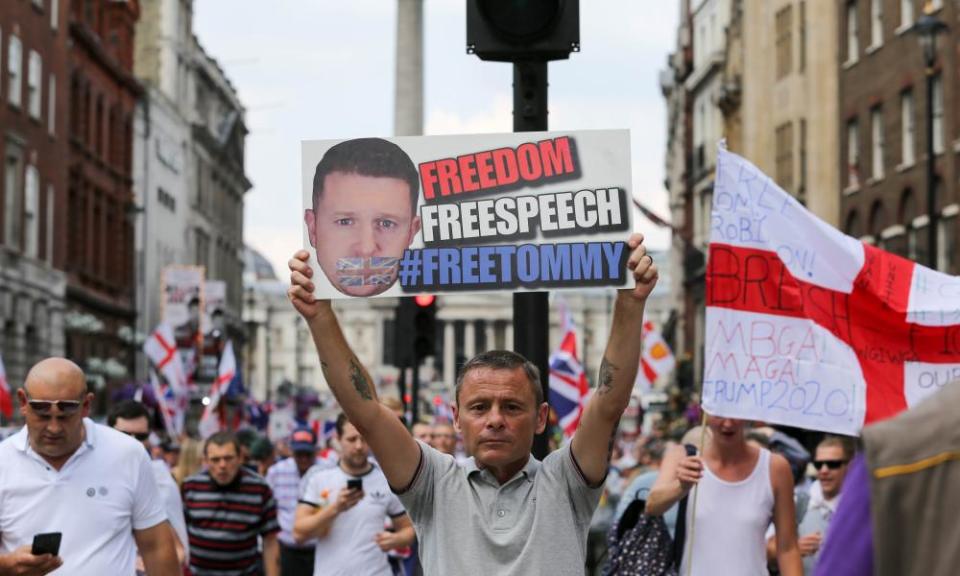For rightwing hypocrisy on free speech, look at Anjem Choudary

Nobody called Lord Holroyde a “snowflake” when in 2016 he sentenced hate preacher Anjem Choudary to five and a half years in prison for words that he’d said. Choudary was encouraging people to join Islamic State – a proscribed, banned terrorist organisation. Be in no doubt: it was language, not action, which led to a conviction.
Unsurprisingly there was no outpouring of outrage claiming Holroyde was turning the nation into a mollycoddled mass of censorious drips too afraid to tackle Choudary’s abhorrent views with sensible arguments. Many celebrated his imprisonment, and now some conservative commentators are demanding – if his views are unchanged – that he should remain locked up for longer rather than be released next month as is planned.
What’s more likely is that upon his release Choudary will have over 20 tight restrictions imposed on his ability to spread the hate he has become so known for. It’s a state-imposed no-platforming. And yet, we hear no outcry from “snowflake”-obsessed journalists in the name of free speech. Restricting Choudary’s chances to spread his views, given the threat he presents, seems a reasonable reaction … because it is.
It’s well worth reading the remarks delivered by the judge in Choudary’s sentencing. Despite only finally falling foul of the law after being found to have pledged support to Isis, Holyrode points out that Choudary used his platform to spread his messages of division and violence long before he was arrested. Choudary is said to have “taken every opportunity to address audiences by various means”. He said to Choudary: “You wanted to address a large audience because you know that you were held in high regard by your followers, and that they could therefore be expected to be influenced by what you said.”
“Those who already held views in favour of Isis would no doubt have been encouraged and strengthened in those views by what you said, and that in itself makes your offending serious; but you were also aiming at a wider audience,” the judgment continues.
Choudary’s views, and more importantly his ability to communicate and share them, led to his extremism being propagated. What’s more, we know they contributed to encouraging others to engage in acts of indiscriminate, abhorrent violence. He was linked to one of the men who killed the soldier Lee Rigby, and the London Bridge attacker, Khuram Butt. His words are said to have influenced at least 100 British jihadists.

At the time of his sentencing, the question of who was responsible for giving Choudary airtime was widely discussed. “His pulpit was not to be found in mosques but on the television screen and in national newspapers,” wrote Miqdaad Versi, a spokesperson for the Muslim Council of Britain. Choudary was called upon for comment because his words made for good copy. Those who made space for Choudary’s views must now look back on doing so with some regret. Invitations to appear on Newsnight will no longer be forthcoming. One must hope that Choudary’s views are never allowed back into the mainstream again.
Meanwhile, there were four far-right terror plots thwarted by police in 2017. In the same year, we witnessed the Finsbury Park mosque terror attack carried out by Darren Osborne; it was only the previous year that the nation had reacted with horror to the killing of Labour MP Jo Cox. In just two years, racist incidents at universities have risen by almost 60%. Just like those Choudary influenced, the perpetrators of these far-right atrocities were radicalised, too. Police say it took just three or four weeks for Osborne’s extremism to emerge – evidence from devices he used show that he accessed posts by Tommy Robinson, Britain First and others.
In sentencing Thomas Mair, the murderer of Jo Cox, Mr Justice Wilkie stated: “It is clear from your internet and other researches that your inspiration is not love of country or your fellow citizens, it is an admiration for Nazism, and similar anti-democratic white supremacist creeds where democracy and political persuasion are supplanted by violence towards and intimidation of opponents and those who, in whatever ways, are thought to be different and, for that reason, open to persecution.” Just three words need changing, and he could be talking about Isis.
But when it comes to the far right, we refuse to learn. Steve Bannon is invited to speak at international festivals; racist commentators find a home in our national press. Supporters of Tommy Robinson are given primetime slots without scrutiny.
The law is a complex beast, and suggesting which speech should and shouldn’t fall foul of legislation would be to go well beyond my station. Treading the fine line between national security, freedom of expression and state censorship is undoubtedly a complex task. But Choudary’s case should nonetheless be a lesson – there are consequences to giving space to those who preach hatred. Student groups and others who decide to refuse to host far-right speakers are often just taking sensible precautions by refusing extremists amplification. Now the rest of us should follow their lead.
It’s commonly accepted that it’s impossible to rationally debate with a man like Choudary, whose warped worldview is based on irrational extremism, an ideology in which violence and terror are inevitable. Of course, many who hear his views react with disgust, but there only need to be a few who are taken in for horror to ensue. It’s not unreasonable for the far right to be treated the same.
And if you’re comfortable with Choudary’s views being sidelined, but think extremists on the far right can be spoken to rationally on a public platform, ask yourself why. Is it because, just possibly, much of white middle-class Britain and the conservative commentariat find the far right a little less personally threatening? Radicalisation isn’t the sole preserve of Islamic extremists.
• Michael Segalov is a contributing editor at Huck magazine, a freelance journalist and author

 Yahoo News
Yahoo News 